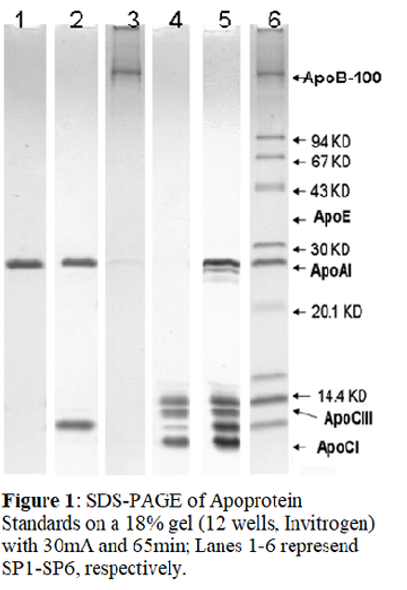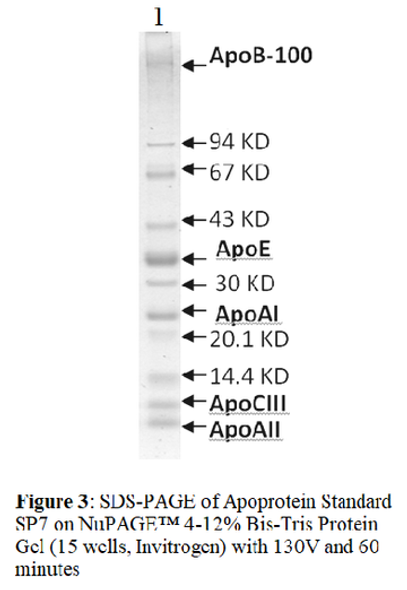Description
Human Apo B-100 SDS-PAGE Standard | ABMC-SP3
| Concentration: | 0.20 mg/ml (vortex before apply for gel electrophoresis) |
| Size: | 100 μl (20 applications of 5 μl each). ApoB-100 Standard is a ready-to-use format - no mixing, heating or reducing required. It is pre-reduced and contains reducing reagents in the loading buffer. The ApoB-100 resolves into bands with 515 kDa. |
|
Source: |
From purified Low Density Lipoprotein; fresh human plasma that has tested negative for Hepatitis C, HIV-I and HIV-II antibodies as well as Hepatitis surface antigens. |
|
Use: |
The Un-Stained ApoB-100 Standard allows you to check the result of your gel run and to judge western transfer efficiency. The attached gel was running with 4 µl of each for lane 1 (ApoB-100) and lane 2 (Std Mix1) on an Invitrogen 4-20% SDS-Gel. |
|
Buffer: |
In loading buffer consists of Tris-HCl, MeSH, SDS, glycerol, and bromophenol. |
|
Storage: |
-20°C for short and long-term storage. Aliquot to avoid repeated freezing and thawing. |
*These products are for research or manufacturing use only, not for use in human therapeutic or diagnostic applications.
IMPORTANCE
ApoB exists in human plasma in two isoforms, ApoB-48 (Chen et al., 1987) and Apo B-100 (Wei et al., 1985, Yang et al., 1986a; 1989a,b; 1990; Chen et al., 1986; Yang et al., 1990, Yang and Pownall, 1992). Apo B-100 is the major physiological ligand for the LDL receptor. Apo B-100 is a large monomeric protein, containing 4536 amino acids (m.w. 515 kDa, Yang et al., 1986b).
Apo B-100 is synthesized in the liver and is required for the assembly of VLDL. It is found in LDL and VLDL after the removal of the Apo A, E and C. Apo B-48 is present in chylomicrons and their remnants. It is essential for the intestinal absorption of dietary lipids. Apo B levels correlate with the risk of coronary disease.
The Apo B protein is directly involved in the retention of LDL with the arterial wall (Olofsson and Boren, 2012). Apo B-48 is synthesized in the small intestine. It comprises approximately half of the N-terminal region of ApoB-100 and is the result of posttranscriptional mRNA editing by a stop codon in the intestine not found in the liver.














